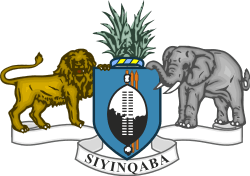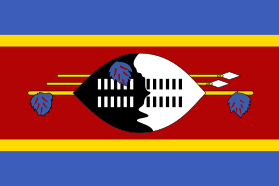Foreign relations of Swaziland
 |
|---|
| This article is part of a series on the politics and government of Swaziland |
|
Monarchy |
|
Government |
|
|
|
Related topics |
Swaziland is a member of the United Nations, the Commonwealth of Nations, the African Union, the Common Market for Eastern and Southern Africa, and the Southern African Development Community. Currently, the Kingdom of Swaziland maintains 11 embassies along with 15 consulates and other representations around the world, while there are five embassies in Swaziland as well as 14 consulates and other representations.
Bilateral relations
| Country | Formal Relations Began | Notes |
|---|---|---|
| 3 May 2013 |
Both countries established diplomatic relations on 3 May 2013.[1] | |
| 1968 |
Both countries established diplomatic relations in 1968.[2]
| |
| 16 September 1968 |
Swaziland established diplomatic relations with the Republic of China (ROC) commonly known as "Taiwan", on 16 September 1968. Swaziland has an embassy in Taipei and ROC has an embassy in Mbabane. As of 2018 it is last one African countries to recognize the ROC instead of the PRC as the sole representative of "China". | |
| ||
| 20 May 2016 |
Both countries established diplomatic relations on 20 May 2016. | |
| ||
| 24 May 1977 |
| |
| September 1968 |
Both countries established diplomatic relations in September 1968[11]. | |
| May 1971 |
| |
| 1975 |
| |
| 28 February 2013 |
Both countries established diplomatic relations on February 28, 2013[14]. | |
| 12 December 1990 |
Both countries established diplomatic relations on 12 December 1990.[15] | |
| See Russia–Swaziland relations | ||
| 1968 | ||
| ||
| 6 November 1968 |
Both countries established diplomatic relations began on 6 November 1968.[18] | |
| 1968 |
Both countries established diplomatic relations in 1968[19]. | |
| See Swaziland–United States relations
The Swaziland embassy in Washington, D.C., USA. The United States assists Swaziland with a number of HIV/AIDS initiatives and programs implemented through the U.S. Agency for International Development (USAID), Centers for Disease Control (CDC), the Peace Corps, African Development Foundation, the Department of Labor, and the Department of Defense. In addition, the U.S. supports small enterprise development, education, military training, institutional and human resources development, agricultural development, and trade capacity building. The U.S. is also the largest bilateral donor to the Global Fund, Swaziland's principal HIV/AIDS funding source. The U.S. Government sends about 4 Swazi professionals to the United States each year, from both the public and private sectors, primarily for master's degrees, and about 5 others for three- to four-week International Visitor programs. | ||
| 21 May 2013 |
Both countries established diplomatic relations on May 21, 2013.[22] |
Swazi embassies, high commissions and consulates abroad
.svg.png)
- Republic of China; in Taipei, Republic of China
- Kingdom of Denmark; in Copenhagen, Denmark
- Republic of Kenya; in Nairobi, Kenya
- Federation of Malaysia; in Kuala Lumpur, Malaysia
- Republic of Mozambique; in Maputo, Mozambique
- Republic of India; in New Delhi, India
- Republic of South Africa; in Pretoria, South Africa
- United Kingdom; in London, United Kingdom
- United Nations; in New York City, the United States
- United States of America; in Washington, DC, the United States
Foreign embassies and consulates in Swaziland
Swaziland and the Commonwealth of Nations
Swaziland was a British protectorate until 1968, when it became an independent native monarchy within the Commonwealth of Nations, when the then Paramount Chief of Swaziland, Sobhuza II became King of Swaziland.
